Steepletop, the home of Edna St. Vincent Millay from 1925 until her death in 1950, is just over the hill from us in the Berkshires. A decade or so ago, after an extensive fundraising and restoration effort by the Millay Society, the house and grounds were opened to the public for tours, but financial setbacks forced the place to close again in 2018. We paid a visit recently during one of the rare occasions when the public is invited back. If you didn’t know better, you could easily miss the old white farmhouse perched on a rise along a back dirt road.
At the height of her celebrity during the 1920s, Millay had been one of the most acclaimed poets in America, filling theaters and concert halls with her readings, and leaving her mark on an entire generation. The critic Edmund Wilson, who twice asked her to marry him, wrote about her “intoxicating effect on people … of all ages and both sexes.” And Steepletop, bought and nurtured by Millay’s beloved husband Eugen Boissevain, was for many years filled with friends, music, poetry and laughter.
In the 1930s Millay experienced a series of misfortunes: a manuscript she’d been working on for several years was destroyed in a fire, and she was injured in a car crash and had to undergo several operations that led to a dependence on painkillers. She suffered a nervous breakdown in 1944 and for a number of years was unable to write. She was hospitalized for exhaustion, alcoholism, and addiction to morphine and other drugs.
Following her husband’s death in 1949, Millay became despondent and needed to be institutionalized. After her release, she returned to Steepletop where she began to write again. But she was desperately lonely and depressed. On October 19th, 1950, in the middle of the night, she fell down a flight of stairs, breaking her neck and dying instantly.
These days, Steepletop seems lost in melancholy, despite the efforts to restore it to its former glory. It’s hard not to imagine that Millay’s own tragic legacy lingers on somehow amid the towering hemlocks and crumbling stone walls.
Dirge Without Music
by Edna St. Vincent Millay
I am not resigned to the shutting away of loving hearts in the hard ground.
So it is, and so it will be, for so it has been, time out of mind:
Into the darkness they go, the wise and the lovely. Crowned
With lilies and with laurel they go; but I am not resigned.
Lovers and thinkers, into the earth with you.
Be one with the dull, the indiscriminate dust.
A fragment of what you felt, of what you knew,
A formula, a phrase remains,—but the best is lost.
The answers quick and keen, the honest look, the laughter, the love,—
They are gone. They are gone to feed the roses. Elegant and curled
Is the blossom. Fragrant is the blossom. I know. But I do not approve.
More precious was the light in your eyes than all the roses in the world.
Down, down, down into the darkness of the grave
Gently they go, the beautiful, the tender, the kind;
Quietly they go, the intelligent, the witty, the brave.
I know. But I do not approve. And I am not resigned.

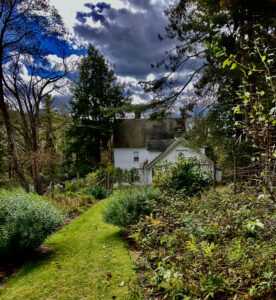
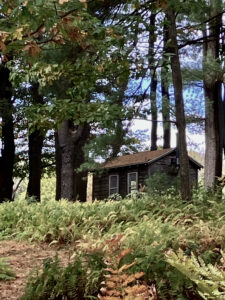
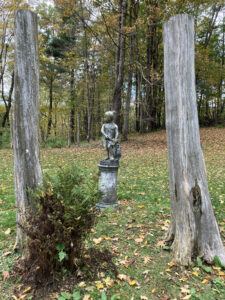

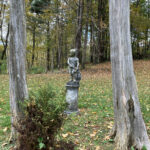

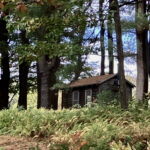
What a beautiful and sad story of her life. The most dreadful thing that I can imagine, even today, is having my life destroyed in a car accident. That is one reason I have given up my car and driving. (we have car service where I live so I can get around without driving.) And the perfect dirge about a grave! Thank you, Lisa, for sharing this story of a haunted house!
Barry, AWOTC
I would love to sneak into that house (in the daytime) as long as the ghosts
don’t chase me away. Edna’s poem is very moving seemed to show how she was feeling at the time.
Dear AWOTC. As usual, your poetic insights are beyond argument — so pithy and wise!
So good to hear from you, Zina. I like the idea of you swanning around in a car service. Xxx
Liza this was sadly beautiful how tragic that her wonderful life was struck so completely and then to lose her husband as well sometimes life seems so unfair the poem is brilliant
It was apparently a very close and complicated marriage, but I do think Millay lost her will to live after her husband died.
Such a haunting, beautiful poem, Liza, and an inspired reframing of Halloween.
Thank you, Elizabeth!
I never knew the full story. Certainly your life on the hill below is quite the opposite. Addiction seems to have been the main culprit that undid her. What a poet though…and her poems live on.
Yes, addiction, but also losing her ability to write as powerfully as she once had.
Wonderful Liza. What a haunting tale. I love the last stanza of “Dirge”. It doesn’t matter how beautiful, kind or tender you are in the end we all go down. I know but I do not approve…
Love you,
Max
It’s unacceptable behavior, Max.
Thank you dear Liza.
So good to hear from you, Hannah.
I’m with Max. I don’t approve and I’m not resigned. What a poem!
I’m with you and Max.
Thank you for this portrait of a place that helped produce such lasting and powerful literature. I’ll always remember the day a few years ago when you snuck Beverly and I onto the grounds after discovering that the estate was no longer open to the public. We wandered over the hill where St. Vincent Millay surely walked on many days, listened to the birds, whose families sung to the great poet, and breathed it in this magnificent location. It’s such a gift to served up to us the history of places like these, with a dessert of one of her best poems.
That was such a great day. I especially remember all the blue birds in that long sloping meadow above the house.
Powerful story. I’m positive there are feelings of spirits in the house. I did, however giggle thinking of you, Anders and Beverly trespassing.
Thanks, Carole. I have a feeling Millay would have approved our trespassing to see her birds!